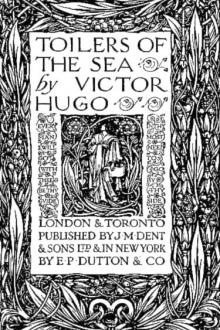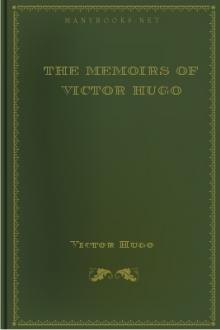Toilers of the Sea by Victor Hugo (trending books to read txt) 📕

- Author: Victor Hugo
- Performer: -
Book online «Toilers of the Sea by Victor Hugo (trending books to read txt) 📕». Author Victor Hugo
In the evening, whenever the weather permitted, she walked for an hour or two in the garden of the Bravées. She was almost as pensive there as Mess Lethierry, and almost always alone. Déruchette went to bed last. This, however, did not prevent Douce and Grace watching her a little, by that instinct for spying which is common to servants; spying is such a relaxation after household work.
As to Mess Lethierry, in the abstracted state of his mind, these little changes in Déruchette's habits escaped him. Moreover, his nature had little in common with the Duenna. He had not even remarked her regularity at the church. Tenacious of his prejudices against the clergy and their sermons, he would have seen with little pleasure these frequent attendances at the parish church. It was not because his own moral condition was not undergoing change. Sorrow is a cloud which changes form.
Robust natures, as we have said, are sometimes almost overthrown by sudden great misfortunes; but not quite. Manly characters such as Lethierry's experience a reaction in a given time. Despair has its backward stages. From overwhelmment we rise to dejection; from dejection to affliction; from affliction to melancholy. Melancholy is a twilight state; suffering melts into it and becomes a sombre joy. Melancholy is the pleasure of being sad.
These elegiac moods were not made for Lethierry. Neither the nature of his temperament nor the character of his misfortune suited those delicate shades. But at the moment at which we have returned to him, the reverie of his first despair had for more than a week been tending to disperse; without, however, leaving him less sad. He was more inactive, was always dull; but he was no longer overwhelmed. A certain perception of events and circumstances was returning to him, and he began to experience something of that phenomenon which may be called the return to reality.
Thus by day in the great lower room, he did not listen to the words of those about him, but he heard them. Grace came one morning quite triumphant to tell Déruchette that he had undone the cover of a newspaper.
This half acceptance of realities is in itself a good symptom, a token of convalescence. Great afflictions produce a stupor; it is by such little acts that men return to themselves. This improvement, however, is at first only an aggravation of the evil. The dreamy condition of mind in which the sufferer has lived, has served, while it lasted, to blunt his grief. His sight before was thick. He felt little. Now his view is clear, nothing escapes him; and his wounds re-open. Each detail that he perceives serves to remind him of his sorrow. He sees everything again in memory, every remembrance is a regret. All kinds of bitter aftertastes lurk in that return to life. He is better, and yet worse. Such was the condition of Lethierry. In returning to full consciousness, his sufferings had become more distinct.
A sudden shock first recalled him to a sense of reality.
One afternoon, between the 15th and 20th of April, a double-knock at the door of the great lower room of the Bravées had signalled the arrival of the postman. Douce had opened the door; there was a letter.
The letter came from beyond sea; it was addressed to Mess Lethierry, and bore the postmark "Lisbon."
Douce had taken the letter to Mess Lethierry, who was in his room. He had taken it, placed it mechanically upon the table, and had not looked at it.
The letter remained an entire week upon the table without being unsealed.
It happened, however, one morning that Douce said to Mess Lethierry:
"Shall I brush the dust off your letter, sir?"
Lethierry seemed to arouse from his lethargy.
"Ay, ay! You are right," he said; and he opened the letter, and read as follows:—
"At Sea, 10th March.
"To Mess Lethierry of St. Sampson.
"You will be gratified to receive news of me. I am aboard the Tamaulipas, bound for the port of 'No-return.' Among the crew is a sailor named Ahier-Tostevin, from Guernsey, who will return and will have some facts to communicate to you. I take the opportunity of our speaking a vessel, the Herman Cortes, bound for Lisbon, to forward you this letter.
"You will be astonished to learn that I am going to be honest.
"As honest as Sieur Clubin.
"I am bound to believe that you know of certain recent occurrences; nevertheless, it is, perhaps, not altogether superfluous to send you a full account of them,
"To proceed then.
"I have returned you your money.
"Some years ago, I borrowed from you, under somewhat irregular circumstances, the sum of fifty thousand francs. Before leaving St. Malo lately, I placed in the hands of your confidential man of business, Sieur Clubin, on your account three bank-notes of one thousand pounds each; making together seventy-five thousand francs. You will no doubt find this reimbursement sufficient.
"Sieur Clubin acted for you, and received your money, including interest, in a remarkably energetic manner. He appeared to me, indeed, singularly zealous. This is, in fact, my reason for apprising you of the facts.
"Your other confidential man of business,
"Rantaine.
"Postscript—Sieur Clubin was in possession of a revolver, which will explain to you the circumstance of my having no receipt."
He who has ever touched a torpedo, or a Leyden-jar fully charged, may have a notion of the effect produced on Mess Lethierry by the reading of this letter.
Under that envelope, in that sheet of paper folded in four, to which he had at first paid so little attention, lay the elements of an extraordinary commotion.
He recognised the writing and the signature. As to the facts which the letter contained, at first he understood nothing.
The excitement of the event, however, soon gave movement to his faculties.
The effective part of the shock he had received lay in the phenomenon of the seventy-five thousand francs entrusted by Rantaine to Clubin; this was a riddle which compelled Lethierry's brain to work. Conjecture is a healthy occupation for the mind. Reason is awakened: logic is called into play.
For some time past public opinion in Guernsey had been undergoing a reaction on the subject of Clubin: that man of such high reputation for honour during many years; that man so unanimously regarded with esteem. People had begun to question and to doubt; there were wagers pro and con. Some light had been thrown on the question in singular ways. The figure of Clubin began to become clearer, that is to say, he began to be blacker in the eyes of the world.
A judicial inquiry had taken place at St. Malo, for the purpose of ascertaining what had become of the coast-guardman, number 619. Legal perspicacity had got upon a false scent, a thing which happens not unfrequently. It had started with the hypothesis that the man had been enticed by Zuela, and shipped aboard the Tamaulipas for Chili. This ingenious supposition had led to a considerable amount of wasted conjecture. The shortsightedness of justice had failed to take note of Rantaine; but in the progress of inquiry the authorities had come upon other clues. The affair, so obscure, became complicated. Clubin had become mixed up with the enigma. A coincidence, perhaps a direct connection, had been found between the departure of the Tamaulipas and the loss of the Durande. At the wine-shop near the Dinan Gate, where Clubin thought himself entirely unknown, he had been recognised. The wine-shop keeper had talked; Clubin had bought a bottle of brandy that night. For whom? The gunsmith of St. Vincent Street, too, had talked. Clubin had purchased a revolver. For what object? The landlord of the "Jean Auberge" had talked. Clubin had absented himself in an inexplicable manner. Captain Gertrais-Gaboureau had talked; Clubin had determined to start, although warned, and knowing that he might expect a great fog. The crew of the Durande had talked. In fact, the collection of the freight had been neglected, and the stowage badly arranged, a negligence easy to comprehend, if the captain had determined to wreck the ship. The Guernsey passenger, too, had spoken. Clubin had evidently imagined that he had run upon the Hanways. The Torteval people had spoken. Clubin had visited that neighbourhood a few days before the loss of the Durande, and had been seen walking in the direction of Pleinmont, near the Hanways. He had with him a travelling-bag. "He had set out with it, and come back without it." The birds'-nesters had spoken: their story seemed to be possibly connected with Clubin's disappearance, if instead of ghosts they supposed smugglers. Finally, the haunted house of Pleinmont itself had spoken. Persons who had determined to get information had climbed and entered the windows, and had found inside—what? The very travelling-bag which had been seen in Sieur Clubin's possession. The authorities of the Douzaine of Torteval had taken possession of the bag and had it opened. It was found to contain provisions, a telescope, a chronometer, a man's clothing, and linen marked with Clubin's initials. All this in the gossip of St. Malo and Guernsey became more and more like a case of fraud. Obscure hints were brought together; there appeared to have been a singular disregard of advice; a willingness to encounter the dangers of the fog; a suspected negligence in the stowage of the cargo. Then there was the mysterious bottle of brandy; a drunken helmsman; a substitution of the captain for the helmsman; a management of the rudder, to say the least, unskilful. The heroism of remaining behind upon the wreck began to look like roguery. Clubin besides had evidently been deceived as to the rock he was on. Granted an intention to wreck the vessel, it was easy to understand the choice of the Hanways, the shore easily reached by swimming, and the intended concealment in the haunted house awaiting the opportunity for flight. The travelling-bag, that suspicious preparative, completed the demonstration. By what link this affair connected itself with the other affair of the disappearance of the coast-guardman nobody knew. People imagined some connection, and that was all. They had a glimpse in their minds of the look-out-man, number 619, alongside of the mysterious Clubin—quite a tragic drama. Clubin possibly was not an actor in it, but his presence was visible in the side scenes.
The supposition of a wilful destruction of the Durande did not explain everything. There was a revolver in the story, with no part yet assigned to it. The revolver, probably, belonged to the other affair.
The scent of the public is keen and true. Its instinct excels in those discoveries of truth by pieces and fragments. Still, amidst these facts, which seemed to point pretty clearly to a case of barratry, there were serious difficulties.
Everything was consistent; everything coherent; but a basis was wanting.
People do not wreck vessels for the pleasure of wrecking them. Men do not run all those risks of fog, rocks, swimming, concealment, and flight without an interest. What could have been Clubin's interest?
The act seemed plain, but the motive was puzzling.
Hence a doubt in many minds. Where there is no motive, it is natural to infer that there was no act.
The missing link was important. The letter from Rantaine seemed to supply it.
This letter furnished a motive for Clubin's supposed crime: seventy-five





Comments (0)